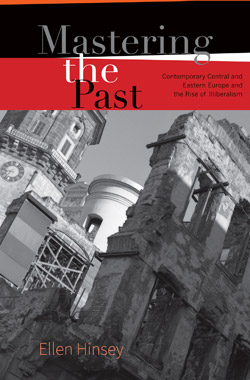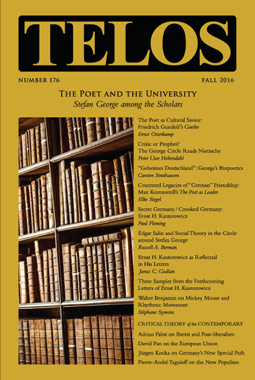By Telos Press · Wednesday, March 1, 2017 New from Telos Press: Ellen Hinsey’s Mastering the Past: Contemporary Central and Eastern Europe and the Rise of Illiberalism. Order your copy in our online store, and save 20% on the list price by using the coupon code BOOKS20 during the checkout process.
 Over the last decade Ellen Hinsey has traveled across Central and Eastern Europe researching a critical shift in the European political landscape: the rise of illiberalism. A quarter of a century after the changes of 1989—and as former Soviet sphere societies come to terms with their histories—the specters of populism, nationalism, extreme-right parties, and authoritarian rule have returned in force. Through a series of eyewitness reports, Mastering the Past offers an insider’s view of key political events, including the 2012 Russian elections, the Polish presidential plane crash in Smolensk, and Prime Minister Viktor Orbán’s vision for a new Hungary. Hinsey explores the darkening hour of European politics with an incisive mind and an eye for detail, recording the urgent danger that illiberalism represents for the new century. Over the last decade Ellen Hinsey has traveled across Central and Eastern Europe researching a critical shift in the European political landscape: the rise of illiberalism. A quarter of a century after the changes of 1989—and as former Soviet sphere societies come to terms with their histories—the specters of populism, nationalism, extreme-right parties, and authoritarian rule have returned in force. Through a series of eyewitness reports, Mastering the Past offers an insider’s view of key political events, including the 2012 Russian elections, the Polish presidential plane crash in Smolensk, and Prime Minister Viktor Orbán’s vision for a new Hungary. Hinsey explores the darkening hour of European politics with an incisive mind and an eye for detail, recording the urgent danger that illiberalism represents for the new century.
Continue reading →
By Arno Tausch · Monday, February 20, 2017 Europe’s effectiveness in combatting terrorism has been diagnosed many times as being very low. There is increasing solid evidence about the devastating nature of global Islamist terrorism and its thousands of victims each month, from Nigeria to Southeast Asia and also, increasingly, in Europe. A recent survey by the French daily Le Monde revealed that in Europe alone, there have been 2,239 victims of terrorist attacks since 2001. Increasingly, global terrorism is not only a political problem; it also has become a global public health problem, despite certain tendencies among Western social scientists to portray global terrorism as a relatively rare phenomenon.
Continue reading →
By Telos Press · Monday, February 13, 2017 Mastering the Past:
Contemporary Central and Eastern Europe and the Rise of Illiberalism
by Ellen Hinsey
 Over the last decade Ellen Hinsey has traveled across Central and Eastern Europe researching a critical shift in the European political landscape: the rise of illiberalism. A quarter of a century after the changes of 1989—and as former Soviet sphere societies come to terms with their histories—the specters of populism, nationalism, extreme-right parties, and authoritarian rule have returned in force. Through a series of eyewitness reports, Mastering the Past offers an insider’s view of key political events, including the 2012 Russian elections, the Polish presidential plane crash in Smolensk, and Prime Minister Viktor Orbán’s vision for a new Hungary. Hinsey explores the darkening hour of European politics with an incisive mind and an eye for detail, recording the urgent danger that illiberalism represents for the new century. Over the last decade Ellen Hinsey has traveled across Central and Eastern Europe researching a critical shift in the European political landscape: the rise of illiberalism. A quarter of a century after the changes of 1989—and as former Soviet sphere societies come to terms with their histories—the specters of populism, nationalism, extreme-right parties, and authoritarian rule have returned in force. Through a series of eyewitness reports, Mastering the Past offers an insider’s view of key political events, including the 2012 Russian elections, the Polish presidential plane crash in Smolensk, and Prime Minister Viktor Orbán’s vision for a new Hungary. Hinsey explores the darkening hour of European politics with an incisive mind and an eye for detail, recording the urgent danger that illiberalism represents for the new century.
Continue reading →
By Jens-Martin Eriksen · Thursday, February 2, 2017 Ten characteristics of the patterns of ethnic conflict in Europe—the way they are reflected in media and culture. They serve as the key to conceptual understanding of the nature of confrontation, aggression in communication in the public sphere in Europe at present, and erosion of democratic values
Continue reading →
By Telos Press · Thursday, November 3, 2016 “The vastness and deadly desolation of the field, the long-distance operation of steel machines, and the relay of every movement in the night drew an unyielding Titan’s mask over the proceedings. You moved toward death without seeing it; you were hit without knowing where the shot came from. Long since had the precision shooting of the trained marksman, the direct fire of guns, and with it the charm of the duel, given way to the concentrated fire of mechanized weapons. The outcome was a game of numbers: Whoever could cover a certain number of square meters with the greater mass of artillery fire, won.”
—Ernst Jünger, Sturm, describing the Battle of the Somme, whose centenary is this year.
Continue reading →
By Russell A. Berman · Wednesday, October 26, 2016 In addition to exploring the history and legacy of the George Circle, Telos 176 (Fall 2016) features a special section of topical writing, introduced here by Russell A. Berman, that continues our ongoing commitment to setting forth a critical theory of the contemporary. Telos 176 is now available for purchase in our store.
 For nearly half a century, Telos has sustained a discussion of critical theory, broadly understood, encompassing various and diverse intellectual traditions and individual thinkers whose work points toward trenchant examinations of our contemporary society and culture. Articles published in the journal operate in various registers—philosophy, political theory, intellectual history, cultural criticism, or more generically “theory”—but despite this range of disciplinary idioms, they each contribute directly or indirectly to the ongoing elaboration of an examination of the present. Beyond their import as contributions to their respective academic fields, Telos articles enhance our ability to articulate the ongoing and constantly evolving critical theory of the contemporary. For nearly half a century, Telos has sustained a discussion of critical theory, broadly understood, encompassing various and diverse intellectual traditions and individual thinkers whose work points toward trenchant examinations of our contemporary society and culture. Articles published in the journal operate in various registers—philosophy, political theory, intellectual history, cultural criticism, or more generically “theory”—but despite this range of disciplinary idioms, they each contribute directly or indirectly to the ongoing elaboration of an examination of the present. Beyond their import as contributions to their respective academic fields, Telos articles enhance our ability to articulate the ongoing and constantly evolving critical theory of the contemporary.
Continue reading →
|
|
 Over the last decade Ellen Hinsey has traveled across Central and Eastern Europe researching a critical shift in the European political landscape: the rise of illiberalism. A quarter of a century after the changes of 1989—and as former Soviet sphere societies come to terms with their histories—the specters of populism, nationalism, extreme-right parties, and authoritarian rule have returned in force. Through a series of eyewitness reports, Mastering the Past offers an insider’s view of key political events, including the 2012 Russian elections, the Polish presidential plane crash in Smolensk, and Prime Minister Viktor Orbán’s vision for a new Hungary. Hinsey explores the darkening hour of European politics with an incisive mind and an eye for detail, recording the urgent danger that illiberalism represents for the new century.
Over the last decade Ellen Hinsey has traveled across Central and Eastern Europe researching a critical shift in the European political landscape: the rise of illiberalism. A quarter of a century after the changes of 1989—and as former Soviet sphere societies come to terms with their histories—the specters of populism, nationalism, extreme-right parties, and authoritarian rule have returned in force. Through a series of eyewitness reports, Mastering the Past offers an insider’s view of key political events, including the 2012 Russian elections, the Polish presidential plane crash in Smolensk, and Prime Minister Viktor Orbán’s vision for a new Hungary. Hinsey explores the darkening hour of European politics with an incisive mind and an eye for detail, recording the urgent danger that illiberalism represents for the new century. 


